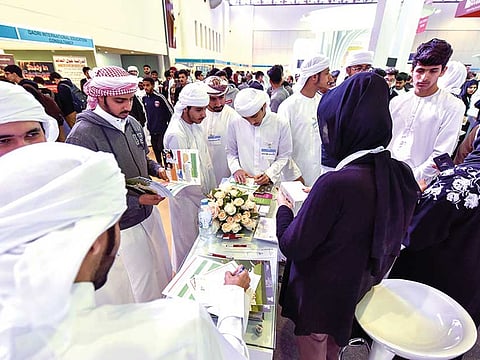Varsities offer ‘future-ready’ degrees for evolving careers
New qualifications to make graduates more employable in today’s fast-changing job market

Sharjah: Universities in the UAE are adding new “future-ready” degrees to keep up with rapidly evolving careers, experts said on Wednesday at the International Education Show in Sharjah.
On offer are “unique” programmes such as postgraduate degrees in sustainable development, city science, and crisis management.
The show, running till Friday at Expo Centre Sharjah, was inaugurated by Shaikh Majid Bin Sultan Bin Saqr Al Qasimi, director of the Department of Suburbs and Villages Affairs.
Today we have the Internet of Things, for example, with parking lots ‘talking’ to cars. A degree such as City Science has been created for leaders and professionals driving sustainability and innovation in cities.”
Over 100 local, regional and international universities are participating this year at the show, geared towards final-year high school students who will be starting their college life soon. The 14th edition of the show is being held under the patronage of the Ministry of Education.
On Wednesday, educationists at the show told Gulf News the new “future-ready” trend is the result of local and global industry transforming rapidly, while study programmes remain largely unchanged.
The result is a gap in the job market between graduates’ skill sets and employers’ needs.
Zaid Maleh, managing director of Modul University Dubai, said: “Industry has changed innovatively over the last decade or so and higher education has to adjust to that. Higher education used to be very ‘classical’, very slow to react to the industry, and this created the gap between higher education and industry when it comes to skill sets, when it comes to graduates being employment-ready.”
He added: “I think higher education realised, more and more, that the ball is in its court, essentially, because the industry is not going to slow down [for higher education]. New jobs have been created, new specialisations are coming along and new expertise needs to be trained to fulfil these elements in the industry.”
Maleh said Modul University Dubai’s ‘Master of Science in Development, Management and Policy’ is a “perfect example of how the university has reacted to the industry’s needs”.
Total tuition fees for the two-year programme are around Dh82,500.
“Everyone’s talking about sustainability but, really, higher education has failed to address sustainability on that deep level. So we plugged with the industry and developed an academic programme that gives people the opportunity to educate themselves in the depth of what sustainability can offer today.”
Another recently added degree, at Rochester Institute of Technology Dubai (RIT Dubai), is ‘Master of Science in Professional Studies: City Science’, introduced a year and a half ago.
Mohaned Saleh, associate director of admissions and student recruitment at RIT Dubai, said urban planning today is not just about zoning laws or infrastructure, but also about designing smart cities that “talk”.
“Today we have the Internet of Things [IoTs], for example, with parking lots ‘talking’ to cars. A degree such as City Science is new; it has been created for leaders and working professionals driving sustainability and innovation in cities. This movement is taking place especially in Dubai Government departments and many of the students are officials from these departments. Our degree is unique in the region,” Saleh said.
Tuition fees for the degree, which is endorsed by Smart Dubai and can be completed in as little as 16 months, are set at around Dh130,000.
Also a degree described as “very new, very unique in the region” is the Master of Crisis and Emergency Management by the University of Modern Sciences (UMS) in Dubai, taught through the joint faculties of UMS and North Dakota State University (NDSU) in the US.
The UMS started the programme three years ago, in affiliation with NDSU. Mohammad Al Lababedi, head of university relations at UMS, said a programme such as this would have been even rarer five years ago. It is aimed at aspiring and current professionals in crisis management, in fields such as law enforcement and Civil Defence, among others.
Al Lababedi echoed views that universities today are trying to increase the employability of their graduates through new programmes more in sync with market needs, as well as to differentiate themselves from competitors.
